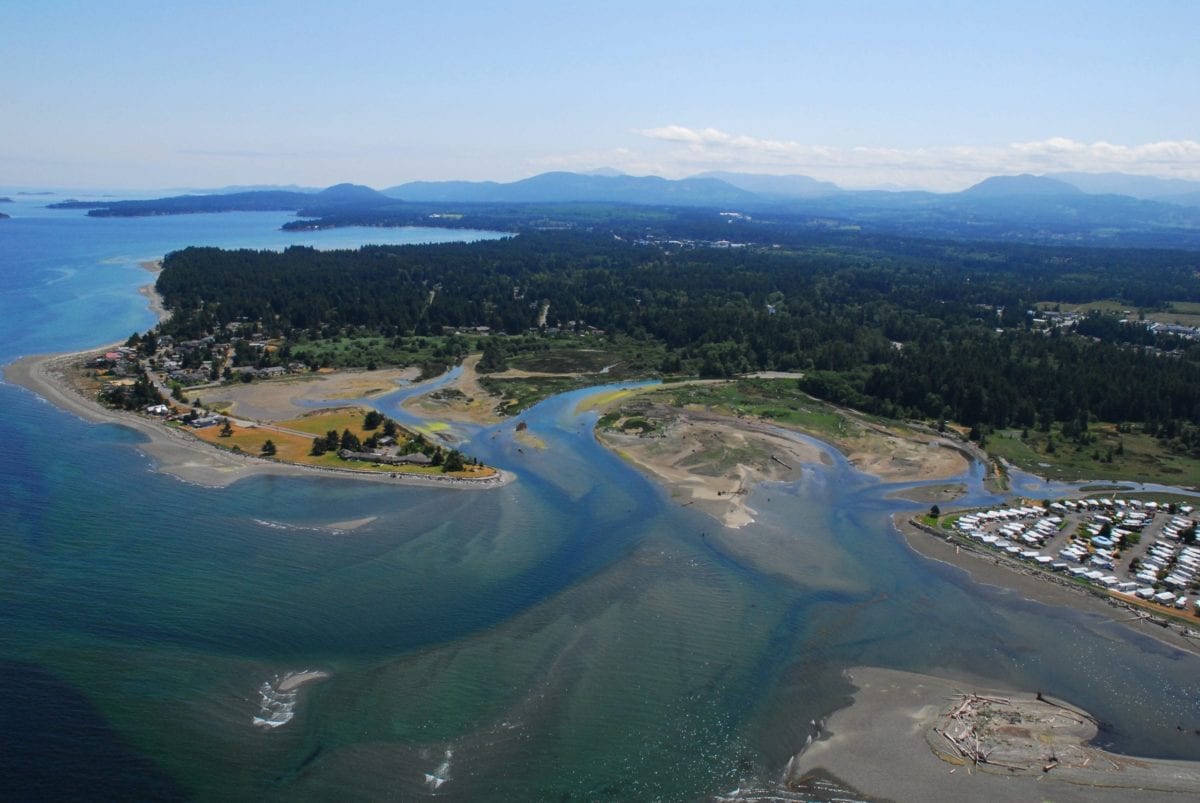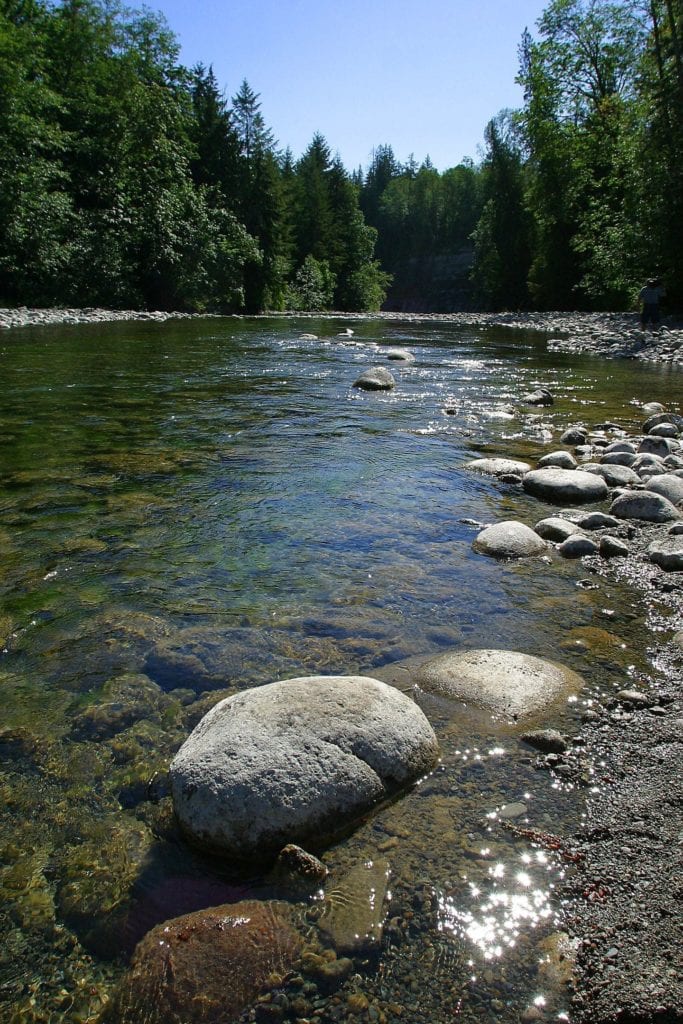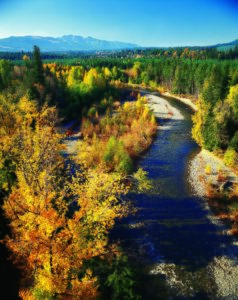
Parksville, BC—If you are walking the trails and beaches at the Englishman River estuary this summer, you may notice some new activity and heavy equipment working. It’s all part of a five-year plan to improve the habitat for fish and wildlife.
The Englishman River estuary and adjacent habitats support over 250 bird species, 23 mammals, plus several amphibians, reptiles, all species of Pacific salmon, and forage fish such as herring and Pacific sand lance. For over 25 years, The Nature Trust of British Columbia and partners have worked to secure land along the Englishman River. Today, over 100 hectares (247 acres) of the Englishman estuary and adjacent forest are protected and form part of the Parksville-Qualicum Beach Wildlife Management Area.
Since the 1930s, the Englishman estuary has been impacted by dikes, roads, residential development, industrial uses, and ditching. Today portions of the estuary are almost completely cut off from natural tidal and river processes. Consequently, the estuary has become less accessible for fish and wildlife that would normally use these habitats for shelter, feeding, and rearing.
“The Nature Trust of BC has been working with partners for decades to acquire and manage ecologically important lands along the Englishman River. It is a key river for fish and wildlife, and this habitat restoration project will have an enormous benefit for the future,” says Jasper Lament, CEO of The Nature Trust of BC.
The first step of this 5-year restoration project is to remove an old abandoned roadway on the west side of the estuary that was originally constructed in the 1960s for log booming operations. Other activities this summer will include enhancing tidal channels; increasing habitat complexity for fish and wildlife; and removing invasive plants. Funding for this project is provided by Canada’s National Wetland Conservation Fund and the Habitat Conservation Trust Foundation.
 The Habitat Conservation Trust Foundation is a BC environmental granting organization that also contributed to the purchase of the conservation lands at Englishman River. Ross Peck, the Foundation’s Chair, says the work being done by The Nature Trust is essential to the survival of fish and wildlife in the watershed. “The Englishman used to be a popular spot for steelhead fishing, but like so many of the runs on southern Vancouver Island, the population collapsed in the 1990s and is now only a fraction of its historical size,” says Peck. “It’s death by a thousand cuts: the human impacts on these systems have severely affected the fish and wildlife that depend on them. We need to strongly invest in the habitat that’s left to give the fish a fighting chance.”
The Habitat Conservation Trust Foundation is a BC environmental granting organization that also contributed to the purchase of the conservation lands at Englishman River. Ross Peck, the Foundation’s Chair, says the work being done by The Nature Trust is essential to the survival of fish and wildlife in the watershed. “The Englishman used to be a popular spot for steelhead fishing, but like so many of the runs on southern Vancouver Island, the population collapsed in the 1990s and is now only a fraction of its historical size,” says Peck. “It’s death by a thousand cuts: the human impacts on these systems have severely affected the fish and wildlife that depend on them. We need to strongly invest in the habitat that’s left to give the fish a fighting chance.”
This project will be coordinated by the Vancouver Island Conservation Land Management Program on behalf of The Nature Trust of BC, and will also involve several partners including Fisheries and Oceans Canada, Ministry of Forests, Lands and Natural Resource Operations, BC Conservation Foundation, Mid-Vancouver Island Habitat Enhancement Society, the Arrowsmith Naturalists, and Guardians of Mid-Island Estuaries Society.
“The Englishman Estuary is critical to juvenile Pacific salmon. Juvenile Chinook, Coho, and Chum salmon may spend weeks to months growing and adapting to more saline conditions before moving offshore. Sea-run Cutthroat Trout and the iconic Winter Steelhead frequent the estuary for shorter periods, but still rely on its diverse food supply for critical growth and as an important staging area before migration up-river. This restoration project is a valuable step to fully restoring the estuary’s natural productivity and fish rearing potential,” says Craig Wightman with the BC Conservation Foundation.
 As part of this restoration project, construction work involving heavy machinery will take place in the estuary for two weeks this summer. To ensure public safety, some areas and walking trails will be closed while the old roadway is being removed. Access will be restricted and we ask the public to please obey signs.
As part of this restoration project, construction work involving heavy machinery will take place in the estuary for two weeks this summer. To ensure public safety, some areas and walking trails will be closed while the old roadway is being removed. Access will be restricted and we ask the public to please obey signs.
By removing an artificial human-made structure and restoring natural processes, this project will create a more natural estuary habitat which will, in turn, benefit many species of fish and wildlife.
The Vancouver Island Conservation Land Management Program is an innovative strategic partnership program involving the management of over 100 conservation areas on Vancouver Island, and the central and north coast. The partnership has been in place for over 20 years and includes Environment and Climate Change Canada (Canadian Wildlife Service), the Ministry of Forests, Lands and Natural Resource Operations, The Nature Trust of BC, and Ducks Unlimited Canada. We gratefully acknowledge funding for this project from the National Wetland Conservation Fund and the Habitat Conservation Trust Foundation.
Media Contact:
Tom Reid, Manager
Vancouver Island Conservation Land Management Program
(250) 751-3218
